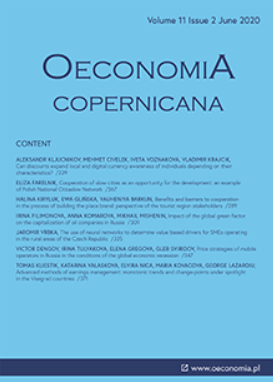Executive compensation and comprehensive income: evidence from Polish listed companies
Executive compensation and comprehensive income: evidence from Polish listed companies
Author(s): Artur SajnógSubject(s): Business Economy / Management, Governance, Accounting - Business Administration
Published by: Instytut Badań Gospodarczych
Keywords: executive compensation; comprehensive income; profitability ratios; firm performance; corporate governance;
Summary/Abstract: Research background: The literature of economics presents the agency problem, which can be mitigated through executive compensation, especially when it is connected with company profits. This relationship has been repeatedly analysed in the corporate governance literature, which shows both positive and negative correlations between these categories. Thus, another approach is presented with comprehensive income, which (in contrast to net income) is generally beyond the control of managers and hinders active earnings management. Purpose of the article: This article presents the evaluation of three stages of the relationship between executive compensation and profitability ratios (RoS, RoA, RoE), which are based on comprehensive income and net income. The main research hypothesis states that in economic practice, it can be assumed that there is a stronger positive correlation between executive compensation and comprehensive income than net income. Methods: The research covered companies listed on the WSE from the industry sector (between 2009 and 2017). The first part of the paper contains the results of correlations between profitability ratios and executive compensation (conducted by means of Pearson’s correlation coefficient). The second part presents the results of three regression models in two versions — the influence that RoS, RoA and RoE have on companies’ executive compensation, based on comprehensive income and net income. Findings & Value added: The analysed companies were characterised by a diversity correlation between the executive compensation and profitability ratios calculated with net profit and comprehensive income. Nevertheless, it must be stressed that the results of the estimation show, in this case, the slightly greater role of comprehensive income than net profit. One can emphasise a certain advantage of comprehensive income over net profit, as the former can inhibit the effects of managers' intentional influence on the value of the reported earnings.
Journal: Oeconomia Copernicana
- Issue Year: 10/2019
- Issue No: 3
- Page Range: 493-509
- Page Count: 17
- Language: English

